Common ground and differences on climate change
Common ground on climate change
Every segment is worried about climate change, to a greater or lesser extent.
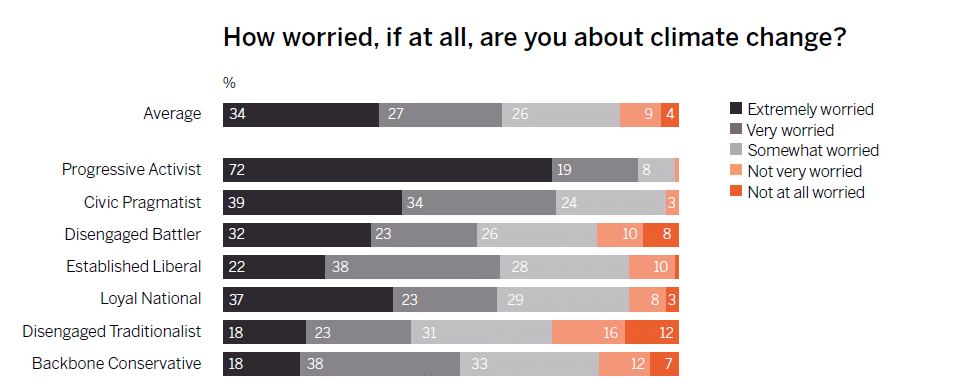
Worry about climate change across segments
A majority in all of the seven segments agree that climate change is caused by human activity (although the majority is slimmer for Disengaged Traditionalists).
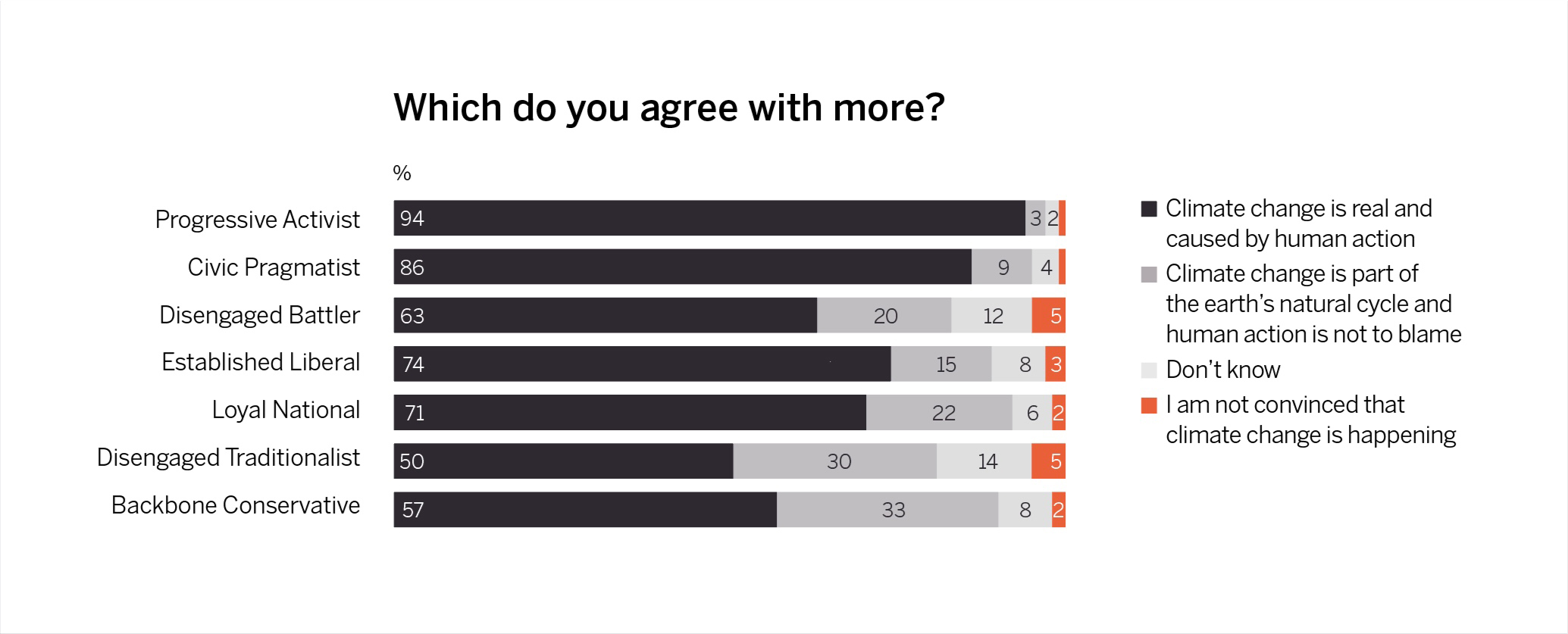
Understanding of causes of climate change
There is relatively high recognition that the UK is already feeling the effects of climate change (just below 60% overall, which is supported by wider recent UK polling on perceptions of climate impacts), although the two ‘Disengaged’ segments remain somewhat unconvinced.
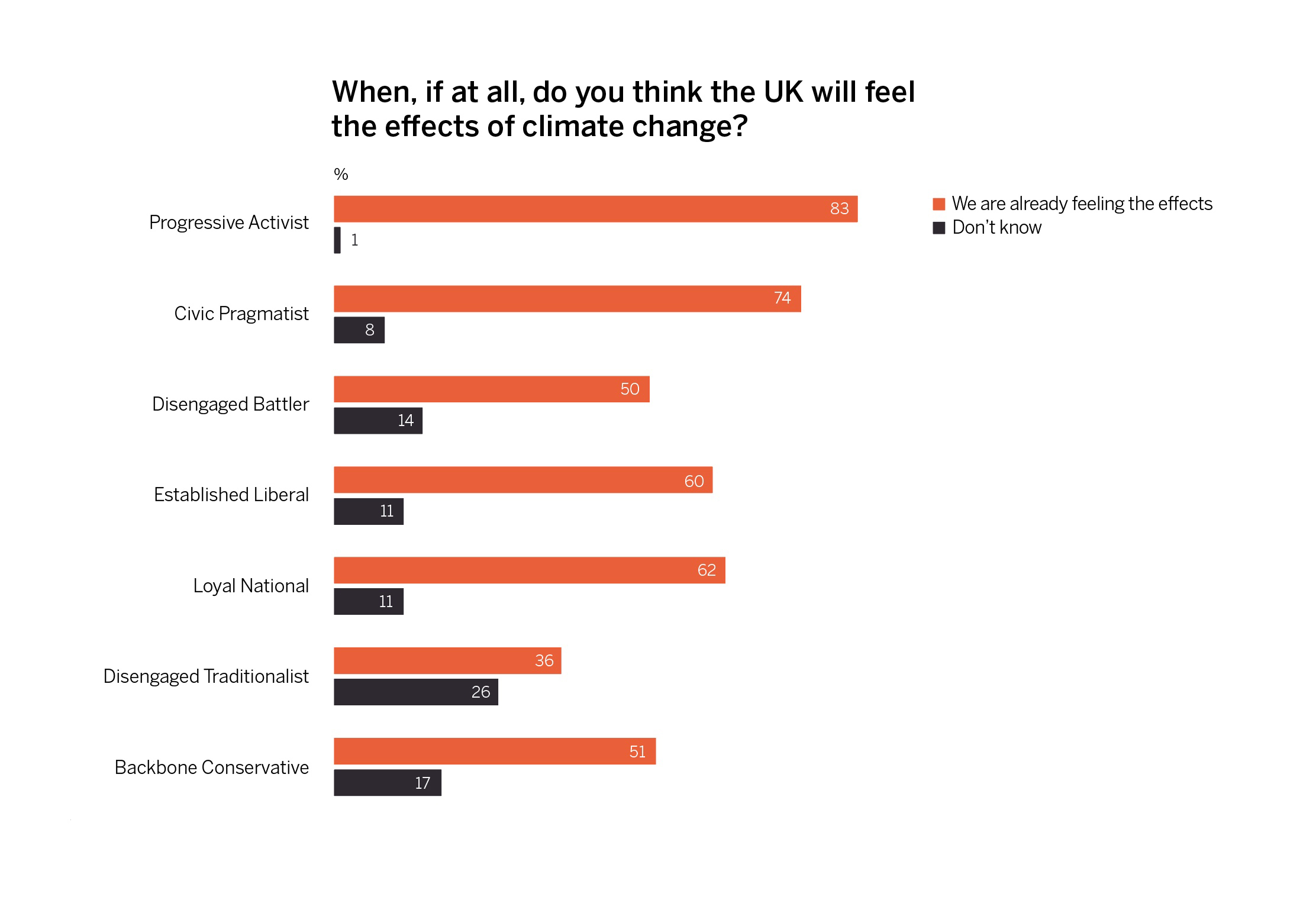
The percentage of people agreeing that we are already feeling the effects of climate change
The majority understands that the threat demands a global, not only a local, response, with at least 60% support for this view in every segment. And most people (average 64%) agree that the UK should be one of the most ambitious countries in the world when it comes to tackling climate change, with at least 50% support for this view across every segment.
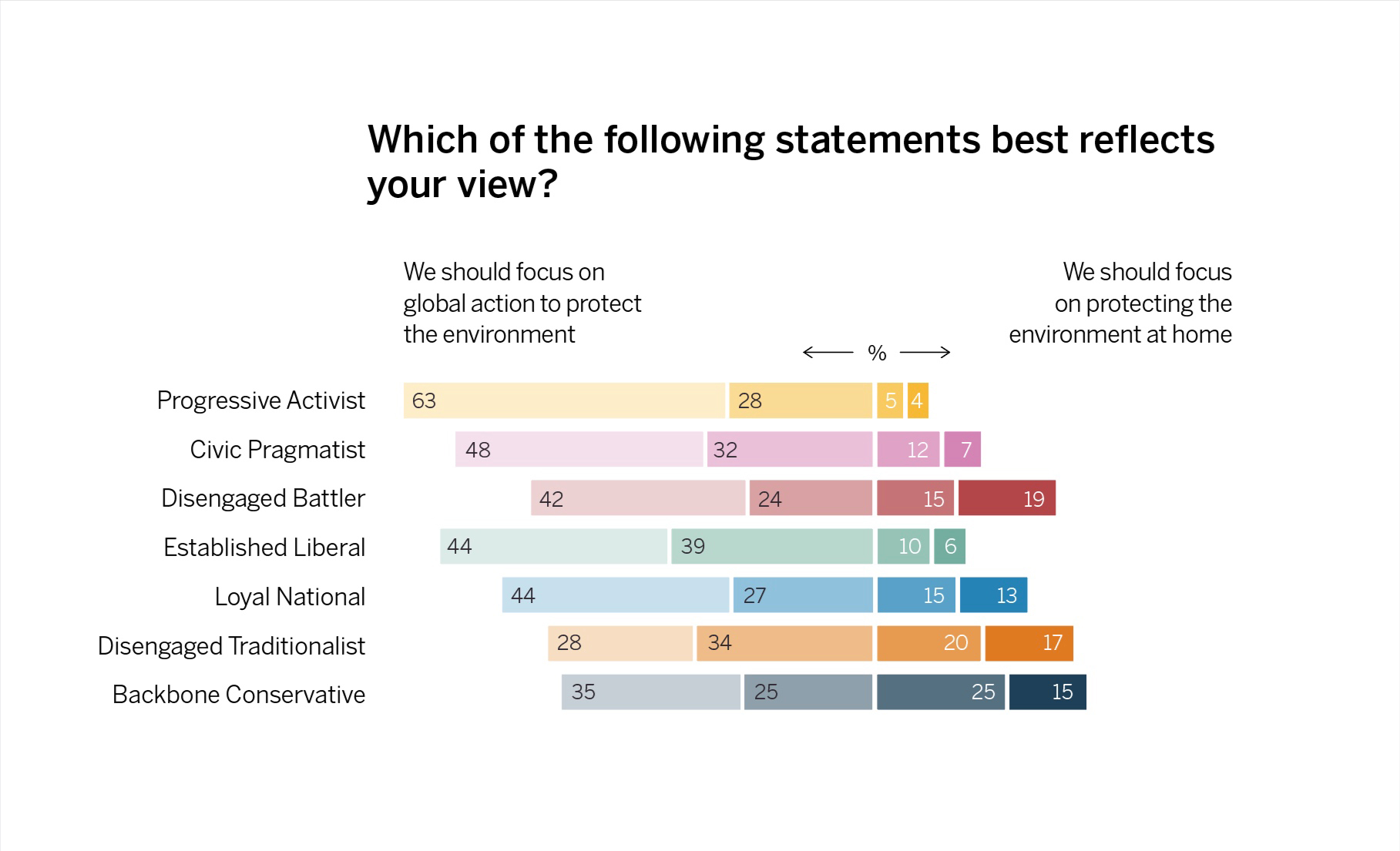
Views on whether the UK should focus on global or local action to protect the environment
Across the segments, there is broad recognition that climate change concerns all of us, regardless of income, background or politics. This points to the fact that there is currently no evidence of a culture war on climate change. A crucial goal for climate advocates across the political spectrum is ensuring that this situation doesn’t change, with disagreement with this view from 26% of Disengaged Traditionalists and 19% of Disengaged Battlers warning us against complacency.
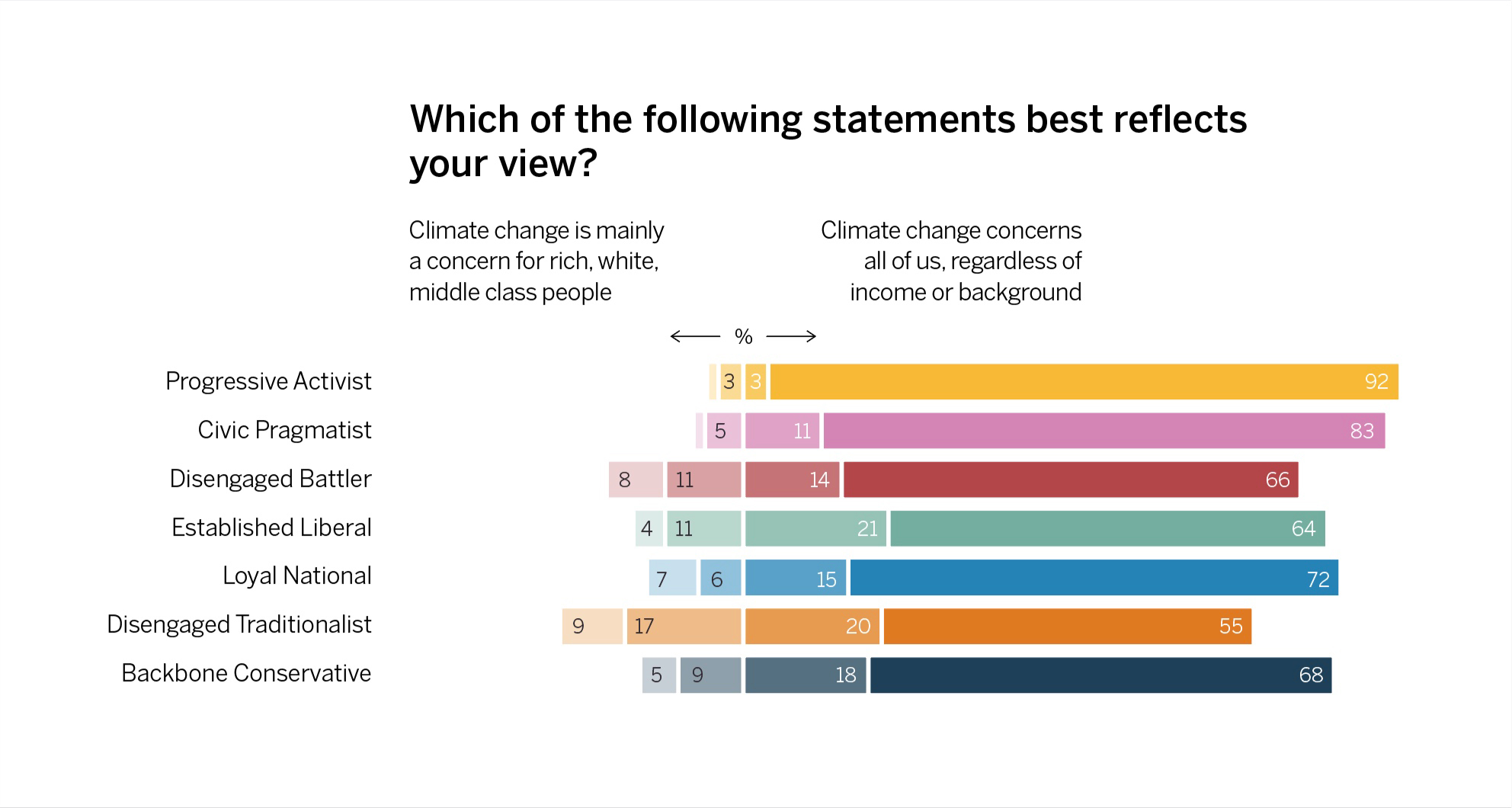
The percentage of people who believe climate change is an issue for rich white middle class people or for everyone
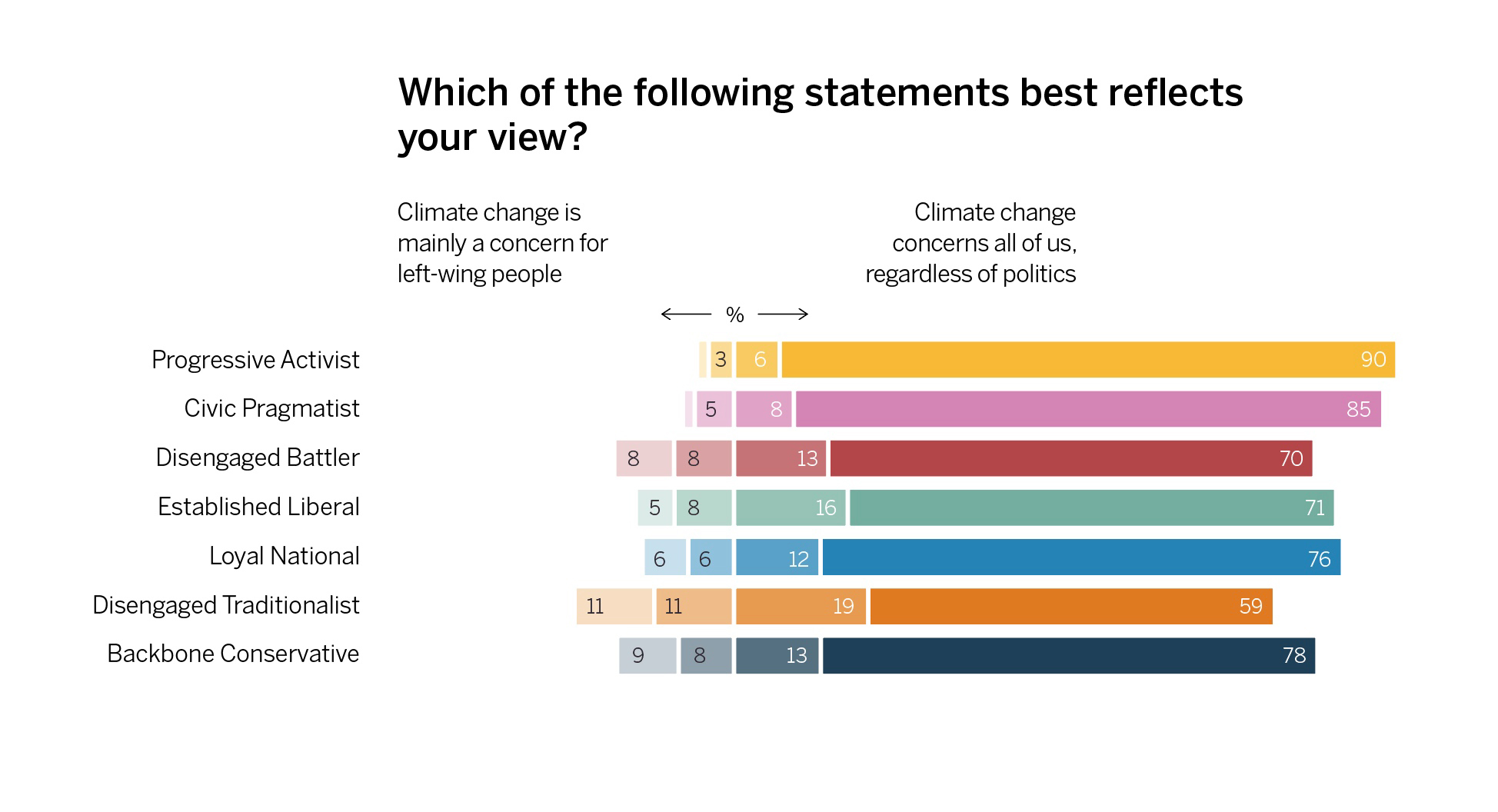
The percentage of people who believe climate change is an issue for left wing people, or for everyone
Although public discourse is increasingly raising issues of intersectional environmentalism (that climate change disproportionately affects marginalised groups, particularly Black, indigenous and other ethnic minority people) in the UK and around the world, there is very low understanding among the British public of the relationship between climate change and race. The majority of all segments except Progressive Activists say that the effects of climate change are the same for everyone, regardless of race.
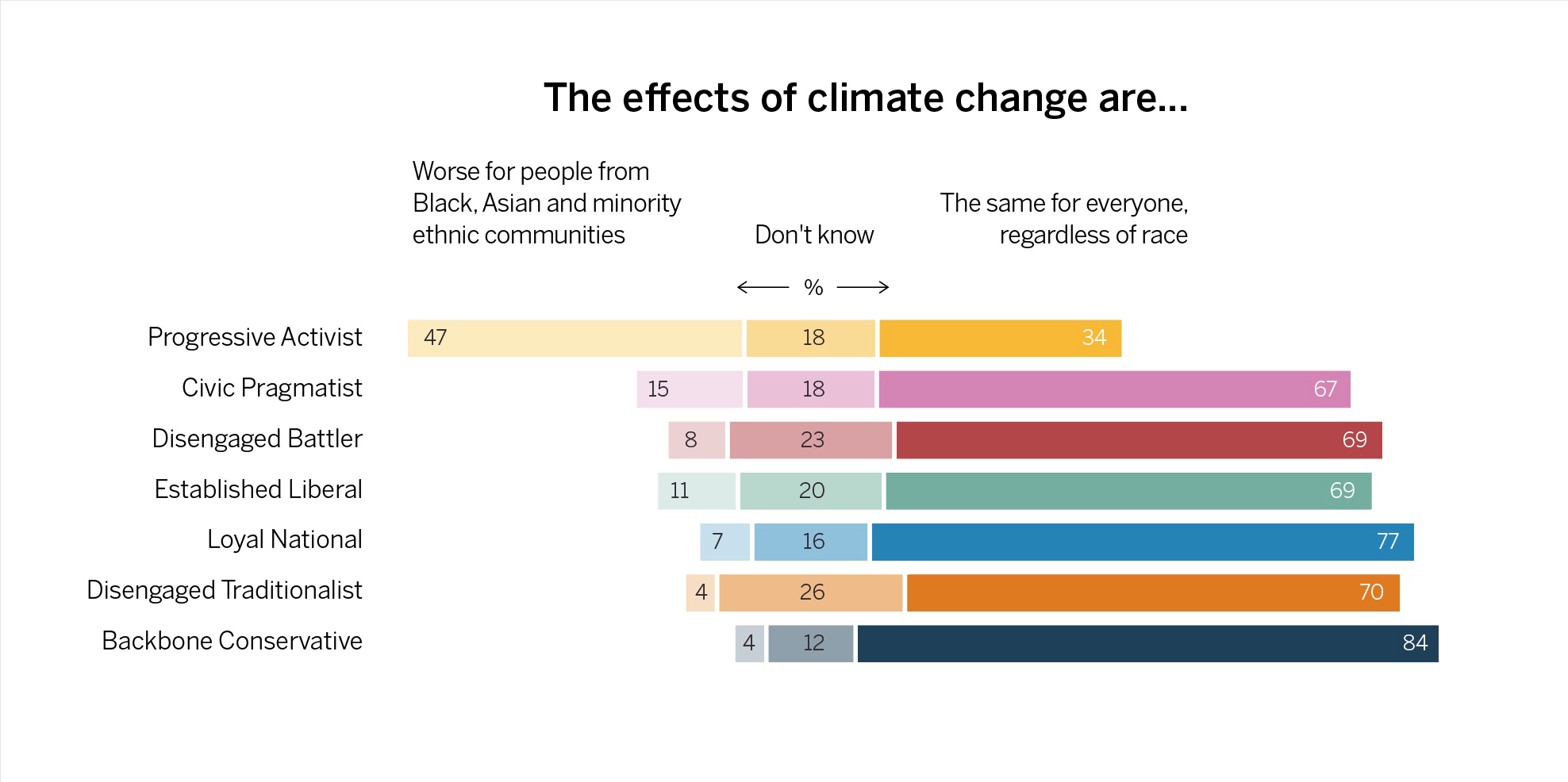
The percentage of people who believe climate change disproportionately affects BAME communities, or for everyone equally
The most agreed-upon benefits of climate action are to protect future generations, create a healthier society and preserve the countryside. Values like fairness (applying stricter environmental rules to everyone), avoiding waste (ending our throwaway culture), unity (coming together in our efforts to protect the environment) and pride (in ‘doing your bit’) are visible across the segments.
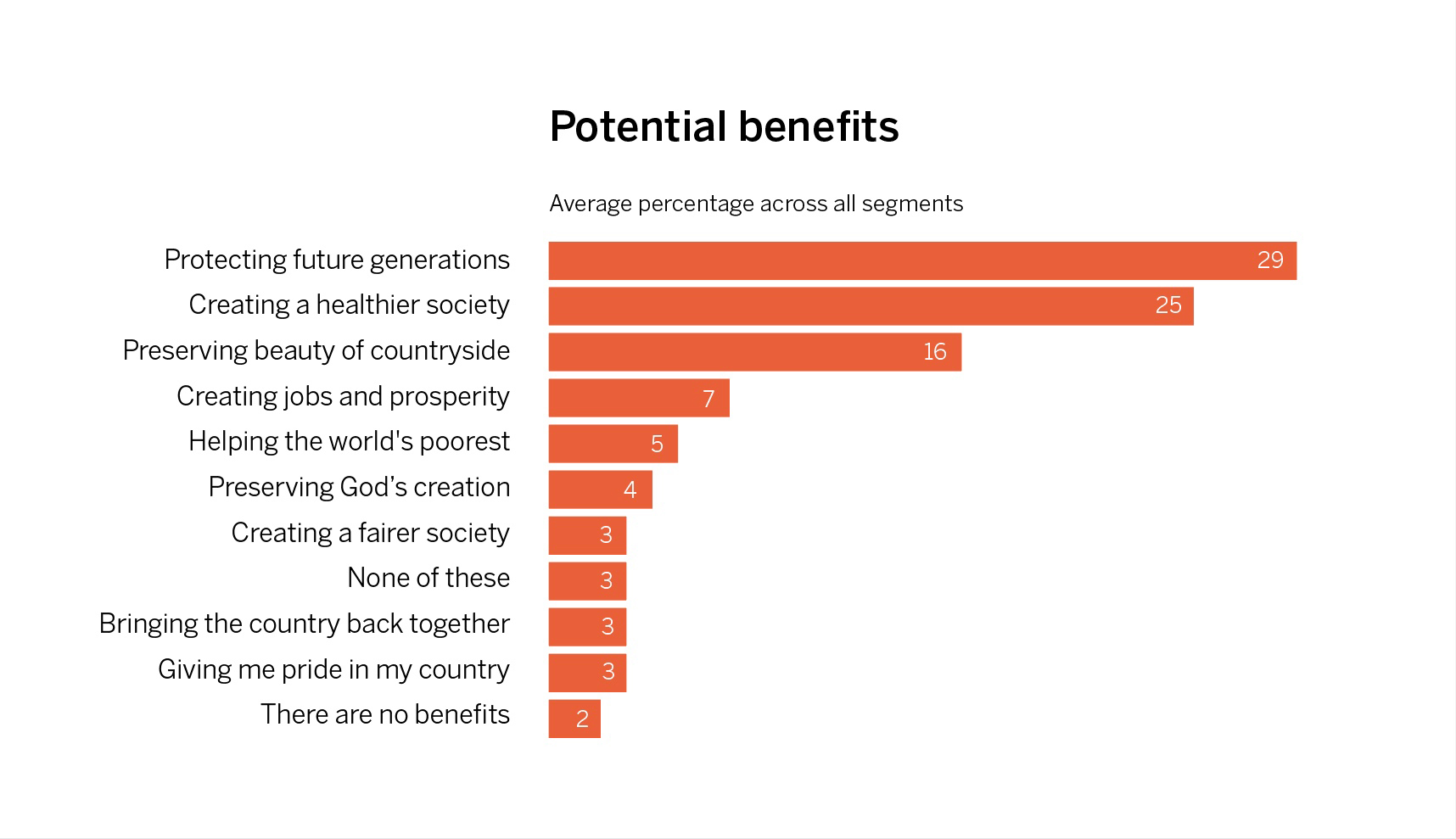
Potential benefits of addressing climate change, average percentage from each segment
Differences on climate change
When it comes to active engagement, Progressive Activists are alone in saying they regularly talk about climate change. They are also the only segment where a majority agrees with both the aims and the tactics of environmental activists, and the only segment that consistently votes on the basis of a party’s climate change policies.
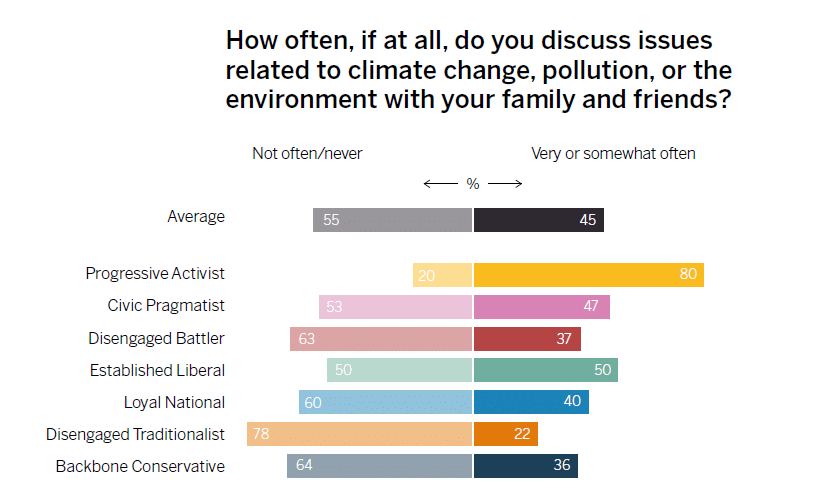
Percentage discussing climate change with friends or family
Although all segments say they are concerned about climate change to some extent, the two ‘Disengaged’ segments and Backbone Conservatives are consistently the least worried about any environmental issues. The two ‘Disengaged’ segments are the least likely to engage in low-carbon behaviours. They also tend to feel less pride in ‘doing their bit’ environmentally, feel far fewer emotions of any kind about climate change, and are more likely to say they are busy enough surviving from day to day without having to worry about climate change.
Certain policies – like preventing airport expansion, taxing meat and dairy products, banning the sale of new petrol and diesel cars by 2030, replacing gas boilers and changing UK farming practices – are divisive, with bigger differences, explored in more detail below, emerging between segments. Using the Britain Talks Climate toolkit, a culture war around these divisive but not yet toxic issues can be avoided.
Segment specific insights - ‘Yes’ and ‘no’ policies
Progressive Activists
The majority of Progressive Activists support taxing frequent flyers and are opposed to airport expansion. They believe in the importance of individual action, even if big companies and other countries keep polluting (and even though companies and governments should bear the greatest responsibility), but they are very distrusting of corporations doing the right thing. All segments endorse recycling, and to a lesser extent reducing food waste, but Progressive Activists are the only segment to show majority support for reducing their meat and dairy intake as a personal step on climate change. That said, even Progressive Activists are dubious about veganism as a lifestyle response to climate change.
We should all do as much as we can but, obviously, the limits are going to be different for everyone depending on how much time, energy and health you have.”
I wouldn’t have an issue with extra taxes on flights in the same way as extra taxes on smoking, taxes on fuel or diesel cars etc. Again, I think there’s a balance of public choice and the government saying, that’s fine, if you want to do that, it’s all good, but there’s a payment that needs to be made for the choices that you have out there.”
Backbone Convservatives
God forbid a few months ago if you were to pull out a plastic straw in public or take it to the checkout, for god’s sake.”
As the quote above suggests, this segment are likely to bristle if lobbied to make personal changes that they consider to be more symbolic than substantive (a suspicion of ‘virtue signalling’ is likely to be high among Backbone Conservatives). There is limited interest in reducing their own meat and dairy intake (perhaps linked to their support for British farmers), very little enthusiasm for vegetarianism, and none at all for veganism. Coupled with the fact that this segment expresses the highest level of agreement that environmentalists are hypocrites who fly on holiday while lecturing the rest of us about how to live (63%, compared to 51% average), Backbone Conservatives are unlikely to be receptive to messages that emphasise an ‘environmental lifestyle’.
However, they are positive towards aspects of ethical consumption that focus on buying local, reducing food waste and supporting British farmers through eating seasonally as a route to sustainability, and their willingness to undertake common sense, practical individual actions, such as recycling and reducing electricity consumption, is higher than average.
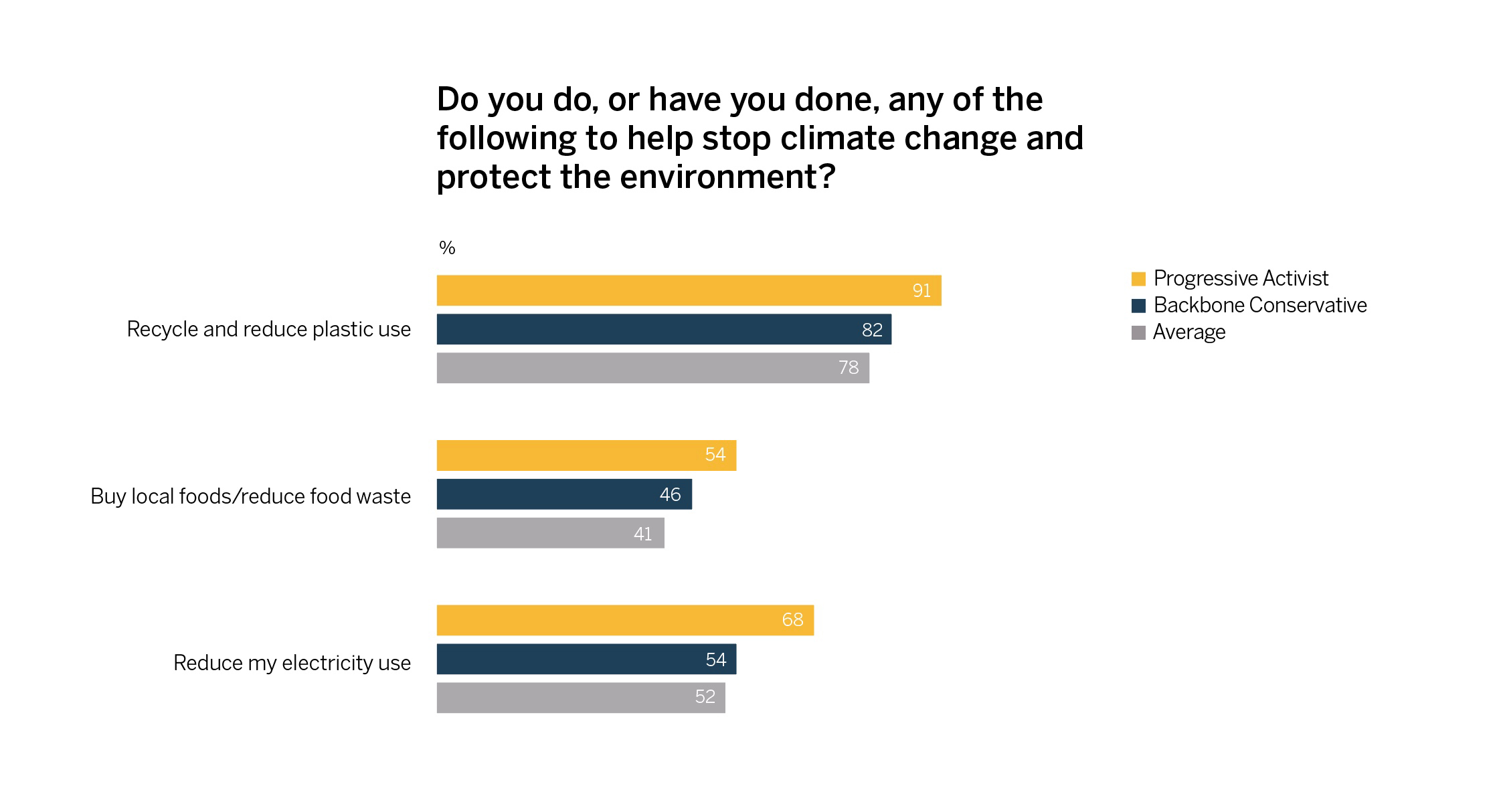
Personal actions to stop climate change: Progressive Activists and Backbone Conservatives
Civic Pragmatists
On potential government policies, Civic Pragmatists are much more against airport expansion (46%) than for it (23%), and are the closest to Progressive Activists on a number of more radical policy proposals like banning new petrol and diesel cars by 2030 (53%) and taxing people who fly the most (60%).
Established Liberals
On airport expansion, Established Liberals are evenly split, perhaps reflecting a degree of willingness to reduce their carbon footprint but also their global identity, which is likely to include a relatively international professional and social network. One of only three segments with a (reasonably) positive view towards reducing meat and dairy consumption, Established Liberals are the second most likely to consider going vegan an attractive option for cutting their personal carbon footprint (although still only registering around 5% support).
I think we need to be accountable; individuals need to be accountable.”
I do think it has to start from the government but I think part of that is just changing the way people think about it … Especially with the young people that I know, the attitude now is smoking is negative. There are so many negative connotations of it that you just don’t think about it as an option really ... But I think it’s really just getting people in the right headspace to think this is wrong, this is right.”
Disengaged Battlers
In general, Disengaged Battlers are less supportive of climate policies than Civic Pragmatists and Progressive Activists. Perhaps due to their financial insecurity and opposition to burdening the least well-off, they are particularly opposed to taxes on meat and dairy products (19% support, 54% oppose).
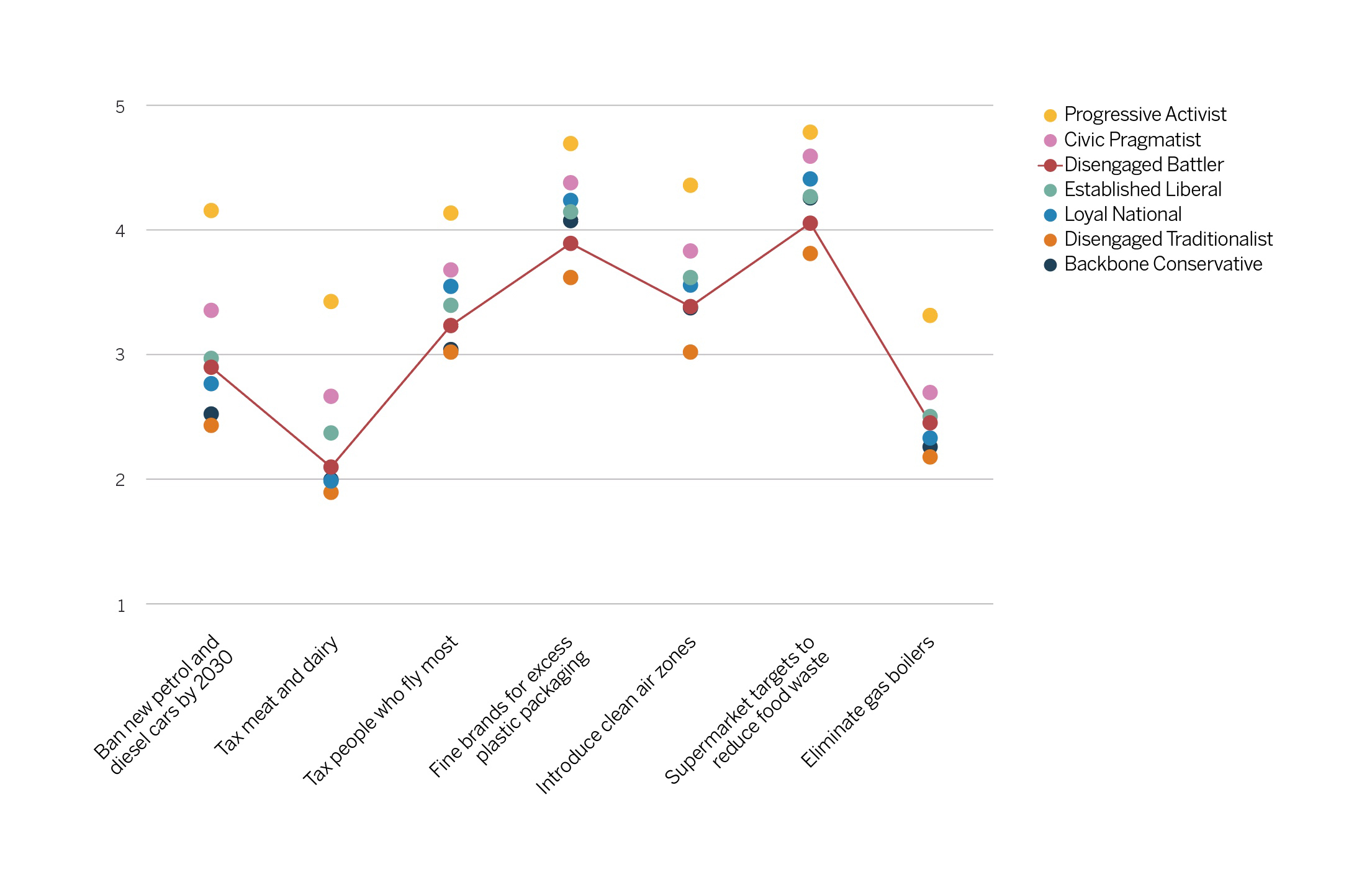
Disengaged Battlers are less supportive of green policies than other left-leaning groups, 1 = low support, and 5 = high support.
However, they show strong support for penalising brands that use excessive or difficult to recycle plastic packaging (76%), and setting targets for supermarkets to reduce food waste (80%). They also have the second highest agreement (76%), after Loyal Nationals, with the view that management will always try to get the better of employees if it gets the chance.
Disengaged Traditionalists
Disengaged Traditionalists are closest to Backbone Conservatives – a much higher socio-economic status segment – on many aspects of climate policy. In supporting airport expansion, rejecting the reduction of cars in cities, and opposing the ban of new petrol and diesel cars by 2030, they line up together.
However, unlike the wealthier Backbone Conservatives, they are the least likely to undertake a range of low-carbon actions in their own lives, including choosing environmentally-friendly brands, reducing their dairy and meat intake, and using public transport more often – even recycling at a significantly lower rate than most of the other segments.
Loyal Nationals
Fairness – or more specifically perceived unfairness – is likely to be a big barrier for engaging with specific climate policies and actions: Loyal Nationals are the segment most likely to agree that a ban on petrol and diesel cars is unfair because it would add extra cost to daily life (70%, compared to 46% average).
I’m really annoyed about these green cars because I’m not necessarily poor, but I can’t afford them. All these new green things that they want people to do are just too expensive for ordinary people.”
There is also strong opposition to taxing meat and dairy products. However, Loyal Nationals show strong support for policies such as implementing food waste targets in supermarkets, and fining brands that use excess packaging.
Perhaps driven by a sense of national pride, around 20% (the third highest) of Loyal Nationals say they would holiday in the UK to avoid a flight, once a year, and they are the most likely to say they have taken actions to improve their home insulation.
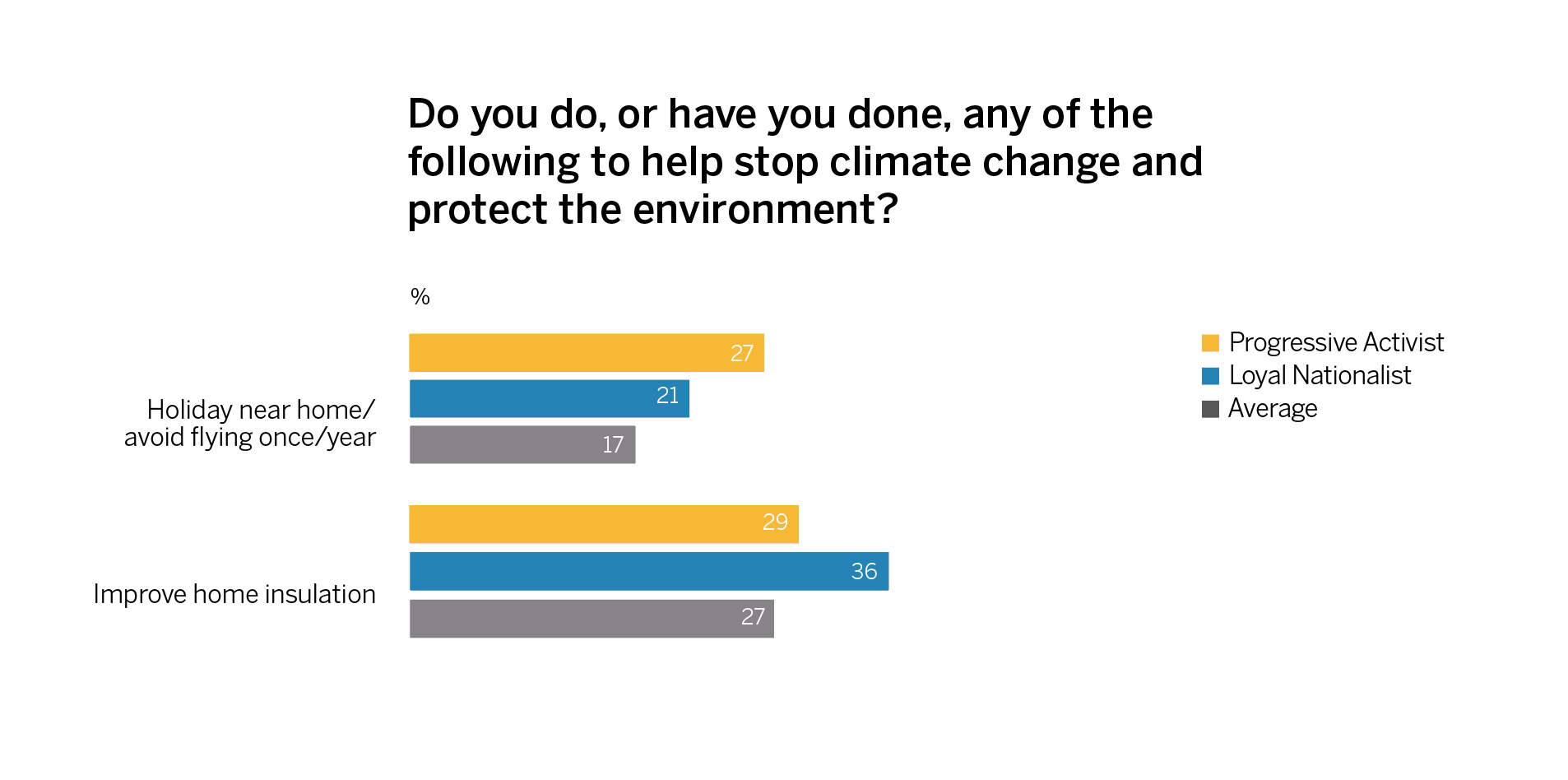
Loyal Nationals are more likely than average to holiday locally, and to improve home insulation
Continue exploring
Sign up to our newsletter
Thank you for signing up to our newsletter
You should receive a welcome email shortly.
If you do not receive it, please check your spam folder, and mark as 'Not Spam' so our future newsletters go straight to your inbox.







